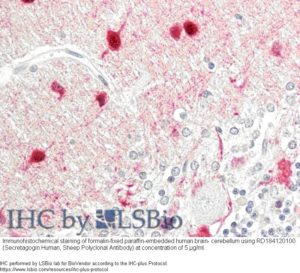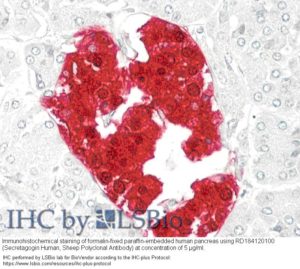Secretagogin Human, Sheep Polyclonal Antibody
Diabetology – Other Relevant Products, Neural tissue markers, Oncology
Type
Polyclonal Antibody
Applications
Western blotting, ELISA, Immunohistochemistry
Antibodies Applications


Source of Antigen
E. coli
Hosts
Sheep
Preparation
The antibody was raised in sheep by immunization with the recombinant Human Secretagogin.
Amino Acid Sequence
The immunization antigen (33.3 kDa) is a protein containing 276 AA of recombinant Human Secretagogin and 10 extra AA, N-terminal His-tag (highlighted). The AA sequence is identical to UniProtKB/Swiss-Prot entry O76038.
Species Reactivity
Human. Not yet tested in other species.
Purification Method
Immunoaffinity chromatography on a column with immobilized recombinant Human Secretagogin.
Antibody Content
0.1 mg (determined by BCA method, BSA was used as a standard)
Formulation
The antibody is lyophilized in 0.05 M phosphate buffer, 0.1 M NaCl, pH 7.2. AZIDE FREE.
Reconstitution
Add 0.2 ml of deionized water and let the lyophilized pellet dissolve completely. Slight turbidity may occur after reconstitution, which does not affect activity of the antibody. In this case clarify the solution by centrifugation.
Shipping
At ambient temperature. Upon receipt, store the product at the temperature recommended below.
Storage/Expiration
The lyophilized antibody remains stable and fully active until the expiry date when stored at –20°C.Aliquot the product after reconstitution to avoid repeated freezing/thawing cycles and store frozen at –80°C. Reconstituted antibody can be stored at 4°C for a limited period of time; it does not show decline in activity after one week at 4°C.
Quality Control Test
Indirect ELISA – to determine titer of the antibody
SDS PAGE – to determine purity of the antibody
– Puthussery T, Gayet-Primo J, Taylor WR, Haverkamp S. Immunohistochemical identification and synaptic inputs to the diffuse bipolar cell type DB1 in macaque retina. J Comp Neurol. 2011 Dec 15;519 (18):3640-56
– Kosaka T, Yasuda S, Kosaka K. Calcium-binding protein, secretagogin, characterizes novel groups of interneurons in the rat striatum. Neurosci Res. 2017 Feb 11. pii: S0168-0102(16)30195-X. doi: 10.1016/j.neures.2017.01.004
